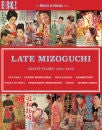Added to your cart
Late Mizoguchi - Limited Edition Box Set (Masters of Cinema)
$80.99

Ugetsu Monogatari (Tales of The Rain And Moon) (Aka: Ugetsu)
Mizoguchi's Ugetsu Monogatari is a highly acclaimed masterwork of Japanese cinema. Based on a pair of 18th century ghost stories by Ueda Akinari, the film's release continued Mizoguchi's introduction to the West, where it was nominated for an Oscar and won the Venice Film Festival's Silver Lion award (for Best Direction).
In 16th century Japan, amidst the pandemonium of civil war, potter Genjuro (Mori Masayuki) and samurai-aspirant Tobei (Ozawa Sakae) set out with their wives in search of wealth and military glory respectively. Two parallel tales ensue when the men are lured from their wives: Genjuro by the ghostly charm of Lady Wakasa (Kyo Machiko); Tobei by the dream of military glory.
Oyu Sama (Lady Oyu) (Aka: Miss Oyu)
Mizoguchi's Oyu-sama (Miss Oyu) is a poignant and contemplative tale of two sisters and their ill-fated relationship with the same man. At the core is Mizoguchi-regular Tanaka Kinuyo (who also stars in Ugetsu Monogatari) as the eponymous Oyu, the older sister who allows marital customs to dictate the lives of those caught up in this complex love triangle.
Continuing the director's fascination with the relationship between affairs of the heart and the social mores that shape and sometimes destroy them, Mizoguchi transforms his subject matter into the realm of the transcendental through the use of long, mobile shots - an approach that reaches its apotheosis in a take of almost six minutes - infused with humanity and emotion.
Sansho Dayu (Sansho the Steward) (Aka: Sansho The Bailiff)
Based on an ancient legend, as recounted by celebrated author Mori Ogai (in his short story of the same name, written in 1915), and adapted by Mizoguchi, Sansho Dayu (Sansho the Steward, aka Sansho the Bailiff) is both distinctively Japanese and as deeply affecting as a Greek tragedy. Described in its opening title as "one of the oldest and most tragic in Japan's history", Mizoguchi depicts an unforgettably sad story of social injustice, family love, and personal sacrifice - all conveyed with exquisite tone and purity of emotion.
Set in Heian era (11th century) Japan, it follows an aristocratic woman, Tamaki (played by Tanaka Kinuyo, who also stars in Mizoguchi's Ugetsu Monogatari), and her two children, Zushio (Hanayagi Yoshiaki) and Anju (Kagawa Kyoko), who are separated by feudal tyranny from Tamaki's husband. When the children are kidnapped and sold into slavery to the eponymous "Sansho" (Shindo Eitaro), the lives of each of the family members follow very different paths - each course uniquely, and insufferably, tragic.
Gion Bayashi (Gion Festival Music) (Aka: A Geisha)
Gion Bayashi is a drama set in the world of the courtesan, contrasting two different types of geisha - on one hand, Eiko (Wakao Ayako), a sixteen-year old orphan who wishes to be taken in and trained; on the other, Miyoharu (Kogure Michiyo), an older, more experienced geisha, who agrees to mentor the younger woman - living under the same roof in difficult personal circumstances. A fascinating, subtle insight into the lives of these women in 1950s Japan.
Chikamatsu Monogatari (A Tale from Chikamatsu) (Aka: The Crucified Lovers)
Based on a centuries old tale with roots in real events, Chikamatsu monogatari (A Tale From Chikamatsu, aka The Crucified Lovers) tells the hauntingly tragic story of a forbidden love affair between a merchant's wife, Osan (Kyoko Kagawa), and her husband's employee, Mohei (Kazuo Hasegawa), in an era when the punishment for adultery was crucifixion.
When a series of innocent events lead to the false accusation of an affair, the pair are forced to flee an almost certain death sentence. On the run, the outlaw couple grow closer together, drawn inexorably towards the romantic crime of which they are accused.
In the hands of Mizoguchi, Chikamatsu Mmnogatari depicts two people caught up in a constricted world where true love and social obligation are at odds. His portrayal of the lovers' dilemma lead famed director Akira Kurosawa to describe the film as 'a great masterpiece that could only have been made by Mizoguchi.'
Uwasa No Onna (The Woman in The Rumour)
Released the same year as Chikamatsu monogatari, Uwasa no onna (The Woman in the Rumour) offers a contrasting portrait of attitudes and mores concerning love and relationships. Set in a modern Kyoto geisha house, the eponymous woman in the rumour is Hatsuko (Kinuyo Tanaka, star of countless Mizoguchi films, including The Life of Oharu, in her last role for the director with whom she was often romantically linked), madame of her own geisha house. When Hatsuko ends up pursuing the same man as her daughter, Yukiko (Yoshiko Kuga), both women are forced to confront their attitudes towards each other and the family business.
Akasen Chitai (Red-Light District) (Aka: Street of Shame)
Akasen chitai (Red Light District, aka Street of Shame) - sadly, the very last film by Kenji Mizoguchi - presents a vivid portrait of prostitution in 1950s Japan.
In a Tokyo brothel named Dreamland - an obvious irony given the faded hopes of those who work there - the lives of five prostitutes intersect. Each has a very different story for how they entered the profession, but what they share is the struggle to make sense of the red light district and its cycle of exploitation.
Filmed shortly before the Japanese government's introduction of an anti-prostitution bill, Akasen chitai is a compelling study of women torn between financial necessity and questions of conscience. It was nominated for the prestigious Golden Lion at the Venice Film Festival, and inspired French critic Jean Douchet to proclaim: 'For me, along with Chaplin's Monsieur Verdoux and Renoir's La Règle du jeu, the greatest film in the history of cinema'.
Yôkihi (Imperial Concubine Yang) (aka: The Princess Yang Kwei-Fei)
Set many centuries ago, Yôkihi (Imperial Concubine Yang, aka The Princess Yang Kwei-fei) recounts the Chinese legend referred to in its title.
In eighth-century T'ang China, widowed Emperor Hsüan-tsung (Masayuki Mori) reigns alone, devoting his life to the composition of music. When he meets and falls in love with a beautiful young woman (Machiko Kyô), who will become his imperial concubine, a tale of political intrigue and rival dynasties is set in motion, with ultimately tragic consequences.
Sumptuously filmed in vibrant colour, Yôkihi is the most ancient of Mizoguchi's costume dramas, yet its central themes of passion, sorrow, and the conflict between love and power remain timeless - it was also nominated for the Golden Lion at Venice.
Special Features:
- High-definition 1080p transfers of all eight films
- Optional English subtitles
- Tony Rayns video discussions on each of the eight films
- Original trailers
- Approximately 200 illustrated pages of booklet material compiled together
- The first time Chikamatsu monogatari, Uwasa no onna, Akasen chitai, and Yôkihi have appeared on Blu-ray anywhere in the world
- Limited edition run of only 2000 copies
- Eureka Entertainment
- 764 mins approx.
- Kenji Mizoguchi
- 12
English, English for the Hard of Hearing
- 1.37:1
- Japanese
- 4
- B
Late Mizoguchi - Limited Edition Box Set (Masters of Cinema)
$80.99
Sold out
Please check region code before purchase.
Delivery & Returns
Ugetsu Monogatari (Tales of The Rain And Moon) (Aka: Ugetsu)
Mizoguchi's Ugetsu Monogatari is a highly acclaimed masterwork of Japanese cinema. Based on a pair of 18th century ghost stories by Ueda Akinari, the film's release continued Mizoguchi's introduction to the West, where it was nominated for an Oscar and won the Venice Film Festival's Silver Lion award (for Best Direction).
In 16th century Japan, amidst the pandemonium of civil war, potter Genjuro (Mori Masayuki) and samurai-aspirant Tobei (Ozawa Sakae) set out with their wives in search of wealth and military glory respectively. Two parallel tales ensue when the men are lured from their wives: Genjuro by the ghostly charm of Lady Wakasa (Kyo Machiko); Tobei by the dream of military glory.
Oyu Sama (Lady Oyu) (Aka: Miss Oyu)
Mizoguchi's Oyu-sama (Miss Oyu) is a poignant and contemplative tale of two sisters and their ill-fated relationship with the same man. At the core is Mizoguchi-regular Tanaka Kinuyo (who also stars in Ugetsu Monogatari) as the eponymous Oyu, the older sister who allows marital customs to dictate the lives of those caught up in this complex love triangle.
Continuing the director's fascination with the relationship between affairs of the heart and the social mores that shape and sometimes destroy them, Mizoguchi transforms his subject matter into the realm of the transcendental through the use of long, mobile shots - an approach that reaches its apotheosis in a take of almost six minutes - infused with humanity and emotion.
Sansho Dayu (Sansho the Steward) (Aka: Sansho The Bailiff)
Based on an ancient legend, as recounted by celebrated author Mori Ogai (in his short story of the same name, written in 1915), and adapted by Mizoguchi, Sansho Dayu (Sansho the Steward, aka Sansho the Bailiff) is both distinctively Japanese and as deeply affecting as a Greek tragedy. Described in its opening title as "one of the oldest and most tragic in Japan's history", Mizoguchi depicts an unforgettably sad story of social injustice, family love, and personal sacrifice - all conveyed with exquisite tone and purity of emotion.
Set in Heian era (11th century) Japan, it follows an aristocratic woman, Tamaki (played by Tanaka Kinuyo, who also stars in Mizoguchi's Ugetsu Monogatari), and her two children, Zushio (Hanayagi Yoshiaki) and Anju (Kagawa Kyoko), who are separated by feudal tyranny from Tamaki's husband. When the children are kidnapped and sold into slavery to the eponymous "Sansho" (Shindo Eitaro), the lives of each of the family members follow very different paths - each course uniquely, and insufferably, tragic.
Gion Bayashi (Gion Festival Music) (Aka: A Geisha)
Gion Bayashi is a drama set in the world of the courtesan, contrasting two different types of geisha - on one hand, Eiko (Wakao Ayako), a sixteen-year old orphan who wishes to be taken in and trained; on the other, Miyoharu (Kogure Michiyo), an older, more experienced geisha, who agrees to mentor the younger woman - living under the same roof in difficult personal circumstances. A fascinating, subtle insight into the lives of these women in 1950s Japan.
Chikamatsu Monogatari (A Tale from Chikamatsu) (Aka: The Crucified Lovers)
Based on a centuries old tale with roots in real events, Chikamatsu monogatari (A Tale From Chikamatsu, aka The Crucified Lovers) tells the hauntingly tragic story of a forbidden love affair between a merchant's wife, Osan (Kyoko Kagawa), and her husband's employee, Mohei (Kazuo Hasegawa), in an era when the punishment for adultery was crucifixion.
When a series of innocent events lead to the false accusation of an affair, the pair are forced to flee an almost certain death sentence. On the run, the outlaw couple grow closer together, drawn inexorably towards the romantic crime of which they are accused.
In the hands of Mizoguchi, Chikamatsu Mmnogatari depicts two people caught up in a constricted world where true love and social obligation are at odds. His portrayal of the lovers' dilemma lead famed director Akira Kurosawa to describe the film as 'a great masterpiece that could only have been made by Mizoguchi.'
Uwasa No Onna (The Woman in The Rumour)
Released the same year as Chikamatsu monogatari, Uwasa no onna (The Woman in the Rumour) offers a contrasting portrait of attitudes and mores concerning love and relationships. Set in a modern Kyoto geisha house, the eponymous woman in the rumour is Hatsuko (Kinuyo Tanaka, star of countless Mizoguchi films, including The Life of Oharu, in her last role for the director with whom she was often romantically linked), madame of her own geisha house. When Hatsuko ends up pursuing the same man as her daughter, Yukiko (Yoshiko Kuga), both women are forced to confront their attitudes towards each other and the family business.
Akasen Chitai (Red-Light District) (Aka: Street of Shame)
Akasen chitai (Red Light District, aka Street of Shame) - sadly, the very last film by Kenji Mizoguchi - presents a vivid portrait of prostitution in 1950s Japan.
In a Tokyo brothel named Dreamland - an obvious irony given the faded hopes of those who work there - the lives of five prostitutes intersect. Each has a very different story for how they entered the profession, but what they share is the struggle to make sense of the red light district and its cycle of exploitation.
Filmed shortly before the Japanese government's introduction of an anti-prostitution bill, Akasen chitai is a compelling study of women torn between financial necessity and questions of conscience. It was nominated for the prestigious Golden Lion at the Venice Film Festival, and inspired French critic Jean Douchet to proclaim: 'For me, along with Chaplin's Monsieur Verdoux and Renoir's La Règle du jeu, the greatest film in the history of cinema'.
Yôkihi (Imperial Concubine Yang) (aka: The Princess Yang Kwei-Fei)
Set many centuries ago, Yôkihi (Imperial Concubine Yang, aka The Princess Yang Kwei-fei) recounts the Chinese legend referred to in its title.
In eighth-century T'ang China, widowed Emperor Hsüan-tsung (Masayuki Mori) reigns alone, devoting his life to the composition of music. When he meets and falls in love with a beautiful young woman (Machiko Kyô), who will become his imperial concubine, a tale of political intrigue and rival dynasties is set in motion, with ultimately tragic consequences.
Sumptuously filmed in vibrant colour, Yôkihi is the most ancient of Mizoguchi's costume dramas, yet its central themes of passion, sorrow, and the conflict between love and power remain timeless - it was also nominated for the Golden Lion at Venice.
Special Features:
- High-definition 1080p transfers of all eight films
- Optional English subtitles
- Tony Rayns video discussions on each of the eight films
- Original trailers
- Approximately 200 illustrated pages of booklet material compiled together
- The first time Chikamatsu monogatari, Uwasa no onna, Akasen chitai, and Yôkihi have appeared on Blu-ray anywhere in the world
- Limited edition run of only 2000 copies
- Eureka Entertainment
- 764 mins approx.
- Kenji Mizoguchi
- 12
English, English for the Hard of Hearing
- 1.37:1
- Japanese
- 4
- B
Customer Reviews
There are currently no reviews.




